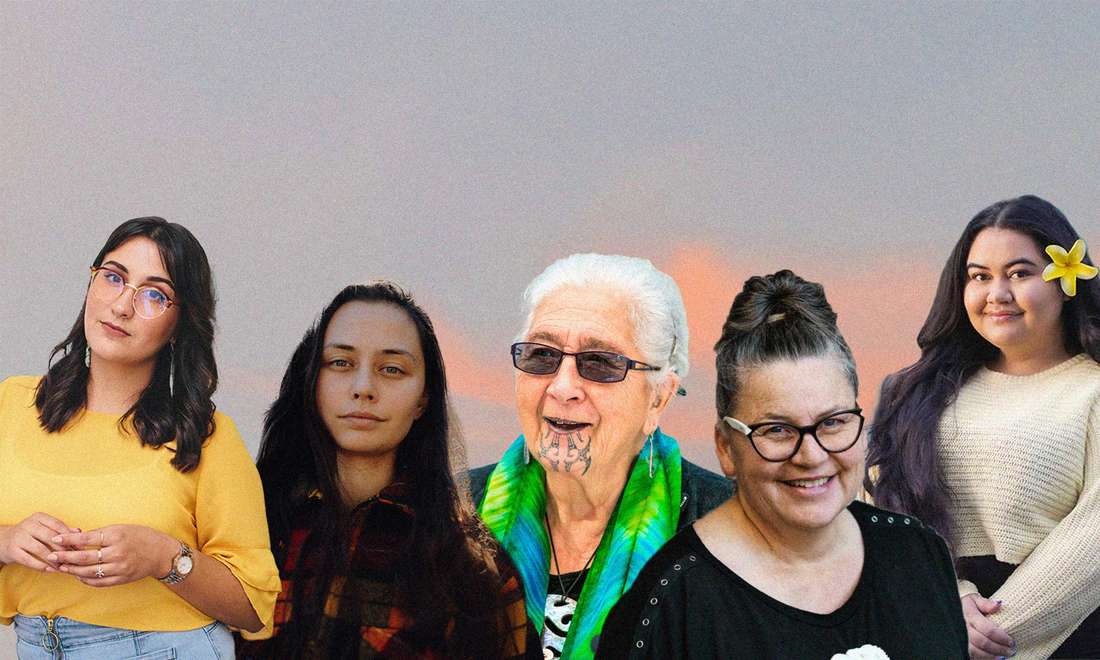
IWD: Five Inspirational Indigenous Activists To Learn From
The theme for March 8th 2022 is “Gender equality today for a sustainable tomorrow”. This theme addresses the intersections of sustainability; social justice and environmental justice are intrinsically linked, and we can’t sustain ourselves and our communities without fighting for our environment.
These 5 activists, whose activism is guided by indigenous values, are a powerful example of how environmental sustainability can’t be separated from the rights of communities.

It’s not hard to be inspired by India Logan-Riley (Kahungunu, Rangitāne, Rongomaiwahine). Their achievements stack up: they attended multiple UN Climate Talks as a member of the Indigenous People’s Caucus, they were awarded the Bright Award from Standford University in 2021, and they are a co-founder of Te Ara Whatu.
India Logan-Riley has spoken about being “born into” climate action as an indigenous person, linking the climate crisis to colonisation and the taking of land. “Indigenous peoples are the first to step up in defence of future generations, our non-human whanaunga and a safe climate,” they state on their Instagram page. “So when indigenous communities put the call out, this must be answered.”

Pauline Tangiora, a Ngāti Rongomaiwahine elder, has been an environmental and Indigenous rights activist for over 40 years. Having been involved in numerous councils and groups, including the Earth Council and the World Council of Indigenous Peoples, and with an impressive list of accomplishments to her name, Pauline is the perfect example of how activism and indigenousness are intrinsically linked.
Pauline Tangiora speaks of hundreds of thousands of young indigenous people dying because of the destruction of forests and waterways, and the need for the world to know about and address this. Her work for the World Future Council focuses on bringing justice to these issues, seeking to ensure that current generations as well as future generations are being thought of.

Rachael Rakena (Ngā Tahu, Ngāpuhi) is an artist, specialising in digital mediums. Her art draws from her whakapapa and has been included in numerous exhibitions, both in Aotearoa and internationally.
Proving that art can be activism, Rachael Rakena is a curator of Mana Moana, a digital art platform that promotes the upholding of healthy and respectful relationships with the Moana in all its forms. Activism is at the heart of Mana Moana’s values: “Mana Moana seeks to draw attention to, critique, and to request action on environmental issues with a future indigenous frame, through the use of technology and art”, with Rachael stating that “in the face of climate emergency this work is timely and relevant.”
Rachael is a powerful example of how indigenous environmental action exists in a variety of forms and shapes – whilst some may turn to speeches and protests, others, like Rachael, can shape their activism into their creative work.

Brianna Fruean is a Samoan climate activist with a lengthy resume. Brianna learnt about climate change as a child and subsequently began to notice the effects of climate change on her home. She became a founding member of the Samoan chapter of 360.org at age 11, and has continued to fight for the climate ever since.
Brianna has attended a number of climate conferences: the UNEP Children’s Conferences, the Rio+20 Summit and the UN Small Island Developing State Conference, to name but a few. Her speeches are inspiring – just check out her COP26 speech for proof of this. Having seen the effects of climate change on island nations, with families needing to move their homes due to rising tides, Brianna sees climate action as a duty to generations to come – and she’s mobilising youth to work alongside her.

Kera Sherwood-O'Regan (Kāi Tahu) is an activist and storyteller. As a climate activist, Kera has represented Indigenous Aotearoa numerous times at the United Nations Convention on Climate Change, stating, at the 2019 Climate Summit, “We are experts on climate. We are the kaitiaki, the stewards of nature.”
Kera is the Co-founder and Impact Director at Activate, an indigenous and disabled social impact agency “that helps people do good, effectively”, an Executive Board member of OraTaiao, and also holds numerous roles in the NGO and public health space.
Kera shows us how rights are intersectional – climate justice is indigenous justice is disability justice, and so on – and how the power of storytelling can be transformative.

